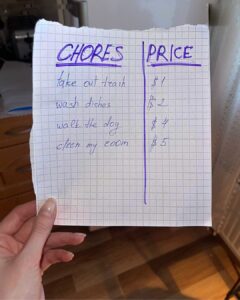Wesley was tired of doing chores. One evening, he pushed his plate away and complained, “I’m sick of meatloaf! Can’t you make anything else?” When his mother asked him to rinse his plate, he snapped, “Why should I? I’m not your slave!” His parents exchanged glances as Wesley boldly added, “If you want me to work, you’d better pay me!” Instead of arguing, his father calmly agreed, “All right, we’ll pay you for every task — but from now on, you’ll pay for what you use too.” Wesley smirked, thinking he’d just struck the best deal ever.

The next day, his father put up a chore chart. Wesley eagerly started checking boxes — walking the dog, taking out the trash, cleaning his room — already counting his future riches.
That evening, when he came home hungry, he found his parents eating dinner without him. “Where’s my plate?” he asked. His dad smiled. “Dinner’s $10 — or you can order your own.” Furious but starving, Wesley ordered pizza and realized it cost more than two days’ work.
The following morning, his mom charged him $6 for breakfast, $12.50 for laundry, and his dad demanded $5.50 for a ride to school. When his football coach announced new jerseys costing $70, his dad said kindly, “You’ll have to save up for it, son. That’s what adults do.” By lunchtime, Wesley’s independence didn’t seem so exciting anymore.
That evening, humbled and hungry, Wesley sat with his parents. “I’m sorry,” he said softly. “I didn’t realize how much you do for me without asking for anything.” His dad smiled and hugged him. “That’s what family is — helping each other because we love each other.” That night, as Wesley enjoyed his mom’s cooking again, he learned a priceless lesson: love doesn’t demand payment — and families thrive when everyone gives, not counts.